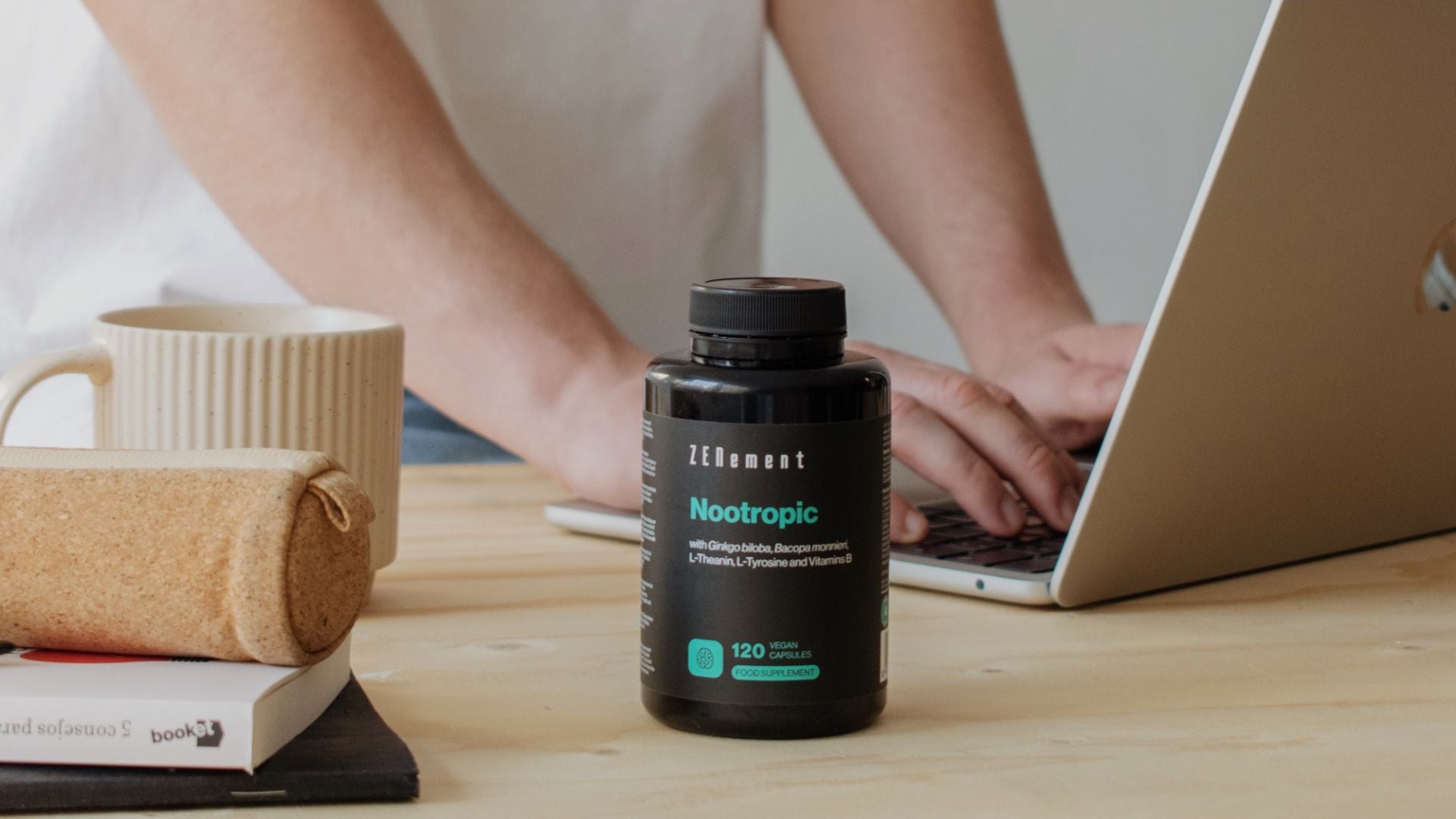Have you ever felt like you needed a little boost to help you focus better or remember information more easily? If so, you may be interested in learning more about nootropics and their benefits for cognitive health.
What Are Nootropics?
Nootropics, whose name comes from the Greek "nóos" (mind) and "tropo" (direction), are substances that can help improve various aspects of mental function. In order for natural nootropics to be effective in improving our concentration and information processing, they contain a number of plant extracts and compounds with very specific functions:
- Green Tea: Derived from the leaves of Camellia sinensis, it is rich in antioxidants and contains L-Theanine, an amino acid that enhances cognitive function by promoting a state of alertness, improving concentration, and sustained attention. Its synergy with caffeine, also found in green tea, enhances the ability to focus and process information without the common side effects of stimulation [1].
- Ginkgo Biloba: Ginkgo Biloba is an extract from one of the oldest living trees, widely used in traditional Chinese medicine. It has been shown to improve cerebral blood flow and protect neurons against oxidative damage. This dual action promotes better concentration and short-term memory by increasing the flow of nutrients and oxygen to the brain and minimizing the effects of oxidative stress on cognitive function [2].
- Panax Ginseng: Panax Ginseng, also known as Korean Ginseng, is a root valued in traditional Asian medicine for its revitalising properties. It is recognised for its ability to improve resistance to stress, which contributes to better cognitive function and an increase in the ability to concentrate and sustain mental work. Its bioactive compounds may help improve memory and cognitive processing speed [3].
- Bacopa Monnieri: A central plant in Ayurvedic medicine, known for its nootropic properties, particularly in improving memory and learning. It stimulates neuronal repair and strengthens synapses, resulting in increased retention of information and reduced forgetting, thus facilitating deep learning and memory consolidation [4].
- Choline: Choline is an essential nutrient that plays a vital role in brain health, particularly in the synthesis of acetylcholine, a key neurotransmitter for memory and cognitive function. Choline supplementation can improve working memory and cognitive fluency, supporting both learning and long-term concentration [5].
- L-Tyrosine: An amino acid found in protein sources, it is a precursor of important neurotransmitters such as dopamine and noradrenaline, which are involved in regulating mood and stress response. Supplementation with L-Tyrosine can improve cognitive performance under stress and fatigue, maintaining concentration and mental alertness [6].
- B vitamins: B vitamins are essential for optimal brain function and energy production. They contribute to neuronal health and the synthesis of neurotransmitters, which are essential for memory and concentration. A deficiency of these vitamins can lead to mental fatigue and reduced cognitive ability, so adequate intake is crucial for maintaining a healthy cognitive function [7].
- Caffeine: Caffeine is a central nervous system stimulant that increases alertness and reduces feelings of fatigue. It improves sustained attention, reaction time, and working memory, making it a popular ingredient in nootropics designed to improve concentration and mental performance under stress [8].
How Do Nootropics Work on a Physiological Level?
Nootropics work on your mind in a variety of ways, depending on their specific type and mechanism of action:
Some nootropics, such as Ginkgo Biloba, can increase blood flow to the brain, which means more oxygen and nutrients reach the brain cells. This can improve overall brain function, making you feel more alert and focused [2].
Other nootropics, such as L-tyrosine, can also affect the production, release, or reuptake of neurotransmitters such as dopamine, serotonin, glutamate, and acetylcholine. Neurotransmitters are chemicals that allow communication between nerve cells in the brain. This effect can improve memory, learning, mood, and attention [6].
On the other hand, some nootropics, such as Bacopa Monnieri, have antioxidant and neuroprotective properties, which means they can help protect brain cells from damage caused by oxidative stress. This may be beneficial for maintaining long-term brain health and preventing age-related cognitive decline [4].
In addition, certain nootropics can promote neurogenesis, the process of growth and development of new neurons and neural connections in the brain. This is important for brain plasticity, the brain's ability to adapt and change in response to new information or experience, which can improve cognition and learning [3].
Finally, some nootropics, such as L-theanine, can affect the body's stress-regulating systems, such as the hypothalamic-pituitary-adrenal (HPA) axis. By reducing levels of stress hormones such as cortisol, they can help improve mood, resilience, and concentration [1].
Benefits of Nootropics
People take nootropics for a variety of reasons, ranging from improved concentration and memory to enhanced problem-solving skills. Here are some of the main benefits of including nootropic supplements in your diet:
Improved concentration: Ideal for those long days studying or working when you need to stay focused.
Memory enhancement: Do you often forget where you left your keys? Some nootropics can help improve your short and long-term memory.
Increased learning ability: Learning new things while taking nootropics may become a little easier thanks to the other two benefits above, improved concentration and memory.
Stress resilience: As explained above, some nootropics work at the physiological level by influencing stress control systems such as the HPA axis.
Who are Nootropic Supplements Recommended For?
If you are looking to improve your cognitive function, you may be interested in adding nootropic supplements to your diet. Below we discuss three cases where we believe nootropics can be particularly beneficial:
- Students: If you are someone who has to pay attention in class for many hours at a time and also study or work on projects in the evenings, it may be worth adding nootropic supplements to your routine.
- Professionals: If your job requires a lot of attention or decision-making, nootropics can help you maintain mental clarity.
- Gamers: Nootropics have recently become popular in the world of gaming, where reflexes and concentration are key. Indeed, some nootropics can offer a competitive advantage in these cases.
However, remember that their use is contraindicated in children.
Nootropics are never a substitute for a balanced diet and an active lifestyle. We recommend that you consult a health professional before taking any supplements.
Zenement’s Nootropic
Our Nootropic features a unique formula that includes Ginkgo Biloba, Bacopa, Green Tea, Tyrosine, and B vitamins.

We recommend taking 1 capsule a day with breakfast to reap the benefits throughout the day. There is no problem taking Nootropic with coffee, the only thing you should bear in mind is that the amount of caffeine contained in the capsule is equivalent to one cup of coffee, so its effects will be enhanced.
Each pack contains 120 capsules, which is a 4 month supply.
In the constant quest for cognitive excellence, nootropics present themselves as a valuable tool for those seeking a boost in concentration, memory, and focus. What are you waiting for to give them a try?
References:
[1] Hidese, S., Ogawa, S., Ota, M., Ishida, I., Yasukawa, Z., Ozeki, M., & Kunugi, H. (2019). Effects of L-Theanine Administration on Stress-Related Symptoms and Cognitive Functions in Healthy Adults: A Randomized Controlled Trial. Nutrients, 11(10), 2362.
[2] Singh, S. K., Srivastav, S., Castellani, R. J., Plascencia-Villa, G., & Perry, G. (2019). Neuroprotective and Antioxidant Effect of Ginkgo biloba Extract Against AD and Other Neurological Disorders. Neurotherapeutics: The Journal of the American Society for Experimental NeuroTherapeutics, 16(3), 666–674.
[3] Malík, M., & Tlustoš, P. (2022). Nootropics as Cognitive Enhancers: Types, Dosage and Side Effects of Smart Drugs. Nutrients, 14(16), 3367.
[4] Walker, E. A., & Pellegrini, M. V. (2023). Bacopa monnieri. In StatPearls. StatPearls Publishing.
[5] Derbyshire, E., & Obeid, R. (2020). Choline, Neurological Development and Brain Function: A Systematic Review Focusing on the First 1000 Days. Nutrients, 12(6), 1731.
[6] Jongkees, B. J., Hommel, B., Kühn, S., & Colzato, L. S. (2015). Effect of tyrosine supplementation on clinical and healthy populations under stress or cognitive demands--A review. Journal of psychiatric research, 70, 50–57.
[7] Tardy, A. L., Pouteau, E., Marquez, D., Yilmaz, C., & Scholey, A. (2020). Vitamins and Minerals for Energy, Fatigue and Cognition: A Narrative Review of the Biochemical and Clinical Evidence. Nutrients, 12(1), 228.
[8] McLellan, T. M., Caldwell, J. A., & Lieberman, H. R. (2016). A review of caffeine's effects on cognitive, physical and occupational performance. Neuroscience and biobehavioral reviews, 71, 294–312.


